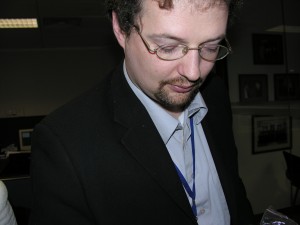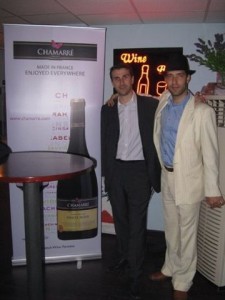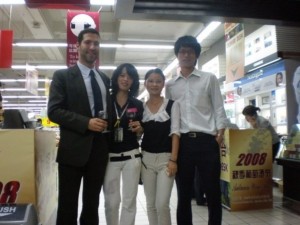
By Jim Boyce
–
Charles Carrard is the director of north China for French Wine Paradox, which handles about 500 different wines in China, employs 200 people, and has its headquarters in Hangzhou and branches in Beijing, Guangzhou, Shanghai, and Shenzhen. I talked to him about the swiftly changing wine distribution market, the fastest growing wine niches, some of the company’s esoteric brands, and more.
–
The scene for wine importers and distributors seems a bit tumultuous. What is happening?
We are finding that the business model created by the top wine importer in China does not work anymore. The idea of using cash sponsorships, of positioning your company to make money a few years down the line, and of building a strong presence in many cities is becoming a thing of the past. The reason is competition.
We previously saw a few big companies dominate the market, but now they have to fight many smaller companies that have good wine selections and lower operating costs. We also saw the big companies rely on the markets in Beijing, Shanghai, and Guangzhou, all of which are very different, but now medium-sized companies in individual cities are able to leverage their local expertise.
This makes it hard for the big companies to keep a grip across the country and they will have to focus on certain cities or areas rather than spreading their resources. This is especially true since a company often depends on one person in a particular market to be a driver, and if they lose that person, the result will be lowered revenues and damage to overall operations.
This does not mean all of the small companies are good. Many of them will close because they lack resources or the ability to drive sales, but new companies will arise and be a continual source of competition for bigger ones.
–
Where will future growth in wine sales come in China?
Chilean wines offer both quality and price, and Chinese consumers like the taste. French wine remains very expensive. It may be affordable for the elite, but the average Chinese consumer is moving toward Chilean, and we already carry five brands–Santa Alvara, Veo Grande, Ribera Del Altiplano, Malakita, and Calama. Customers tend to know Shiraz and Cabernet Sauvignon more than Carmanere, so it’s our job to provide information about the lesser-known grape varieties.
–
FWP is bringing in wines from some lesser-known regions of the world. Could you talk a bit about these?
Our portfolio includes wines from Bulgaria (Blueridge), Greece (Avra), Algeria, Morocco (Sidi Braïm), and Mexico (LA Cetto), and we will likely soon have more wines from Eastern Europe. Our belief is that wines from countries such as France and the United States are not the only good ones, but that each country has its own style. We do not sell a lot of these wines, but they do give our customers more choices.
–
 What would you say to claims China is a dumping ground for wines that can’t be sold elsewhere?
What would you say to claims China is a dumping ground for wines that can’t be sold elsewhere?
This was true with a lot of French wine in the beginning, especially with Bordeaux about ten years ago, although the same could be said about other countries, such as Australia. The attitude was that Chinese don’t know much about wine, so low-quality products could be sent here.
But now countries such as South Africa are able to produce good wine at a good price. At the same time, consumers are learning more about wine. They can use the Internet to check wines and prices. I have seen people in the wine aisle at Carrefour in Beijing call friends in the United States or France and ask if a particular bottle in the store is good value. We don’t see as much of the attitude, “If it’s French, I will buy it.†People are becoming much savvier.
Some French people have a fear of competition from new world wines; that France will lose out. But I think that the more new world wine that comes in, that the more French wine will be sold. The market will come mature and people who start by drinking cheap wine will move up to better brands.
In fact, a study was presented at VinExpo in December of 2007 that provided a forecast of the next ten years. It said that Chinese people would drink increasingly expensive wine and increasingly appreciate the quality of wine. Instead of buying an 80 RMB wine, for example, they will spend 100 RMB or 120 RMB.
–
One of my favorite wines tried last year was the Chamarré Jurancon. What is the story behind it?
Jurancon is a small area southwest of France, near the Pyrenees Mountains. There is only one winery–a cooperative–that can make it. It is not very famous yet and most of its production is for the domestic market, but Charmarré received the right to export it and it is now becoming renown.
We call it a “yellow†wine, and it is made from Gros Manseng and Petit Manseng. It comes from big grapes that have received a lot of sun, and that makes it fruity and sweet, somewhere between Muscat and ice wine.
–
 What is the idea of the “I am a Paradox†events held by French Wine Paradox?
What is the idea of the “I am a Paradox†events held by French Wine Paradox?
Before being a business, wine is a pleasure, and contrary to some wine distributors in Beijing, I don’t want to make customers pay an entrance fee to try my wines. So, I have created “I am a Paradoxâ€, the only private sales event for wine in Beijing, where the entrance is free, and people can try all of the wines on display and then buy the ones they like at a 50 percent discount. Every month we change location, to promote a different restaurant, and rotate wines from the 500 we carry.
We have everyone from CEOs of big French companies to food and beverage people to average customers attend. The idea is to create a “cellar†in your home for a low price. They can try wine at home, decide what they like, and then there is less risk when they order it from a menu at a restaurant.
–
French Wine Paradox is also doing “mobile training.” What does that involve?
You learn different things about your colleagues while sharing a bottle of wine rather than being in a meeting, and this makes wine good for team building. We can send someone to your office, perhaps on a Friday evening from 6 to 8 PM, to do a tasting and encourage your colleagues to try and talk about different wines. This is typically French, as we drink wine more to socialize than to get drunk.
–
How did you get involved in China’s wine scene and in wine in the first place?
By accident: I came to China in 2005 for the first time, for a one-month summer program. I returned to France to finish business school and wanted to return to China, so I created a position for the House of Champagne (Boizel Chanoine Champagne) to be in charge of Asia for Tsarine, a Champagne originally made in honor of a Russian Tsar. The company bought Lanson and asked me to go back to France to look after the Asia, German, East European and Swiss markets. I did not want to spend as much time traveling in Europe as I had in Asia, so I instead joined French Wine Paradox when I learned owner Erwann Le Moigne wanted someone to take care of on-trade business in North China.
I decided to enter FWP since its approach to business differed from other suppliers in China. We are not teachers or wine specialists, but wine lovers who want to share our products with customers. We trust our Chinese staff one hundred percent and we think we know a bit about the way consumers will buy and enjoy wines.
Grape Wall has no sponsors of advertisers: if you find the content and projects like World Marselan Day worthwhile, please help cover the costs via PayPal, WeChat or Alipay.
Sign up for the free Grape Wall newsletter here. Follow Grape Wall on LinkedIn, Instagram, Facebook and Twitter. And contact Grape Wall via grapewallofchina (at) gmail.com.


Why do people think French wines are more expensive that new world wines? If we only think of the top wines, perhaps. But even new world wines from South America, Australia, California can now be extremely expensive. If you look at the value wines, say around $8-15, there is plenty of French wines from secondary areas, such as Languedoc-Rousillon or Entre-Deux-Mers or the Cotes de Bordeaux, and even some of the lesser appellations in Burgundy and Rhone, that are very affordable. The same big and fruity Cabernet Sauvignon that is brought in from South America, can be brought in from Languedoc. Have you tried wines of Louis Fabre? http://www.chevsky.com/2009/01/got-fabre.html
I think it all comes down to branding and PR, rather than what is really available or not. It may be easier to convince people that Chilean wines are inexpensive than to try to change their image of France. After all, once consumers grow up, the notion that French wines are expensive will play right into the hands of marketers.
[quote]Do you feel French wines are still an expensive commodity in China?[/quote]
Actually, there is a market for French wines, and there will always be, but the customers wil change and the products chosen also.
I mean, French wines under 100 RMB will be replaced by Chile wines or new world wines, but very expensive wines such as Grands Crus will still be successful
Well covered and written. It provides a clearer feel of the Chinese wine consumer drinking and spending habits which collates my observation during my stay in Shanghai.
Do you feel French wines are still an expensive commodity in China? The Italians are not far off from this tag too.
In general i feel the new world wines are still much cheaper, definitely below my 300 RMB spend range.
Cheers,
Daniel
http://www.jiuwine.com
Hi Tom,
We have been in China for about 10 years now, but it’s true we like to remain discret…
The name French Wine Paradox comes from the fact that there is a study which has been hold in a lot of countries and which showed that French people, whereas they drink a lot of wine, live longer than other non wine drinker people…
Why? Because they drink everyday 2 glasses of Wine.
Already Hypocrat showed the healthy properties of Wine long time ago..
So, drinking wine (with moderation) is a good way to remain healthy..